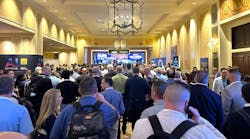This summer, the Board of Commissioners of Broward County, Fla., held public hearings on a proposed Retail Establishment Parking Security Ordinance that would require 24/7 video surveillance of employee and customer parking areas at retail stores across the county. Such ordinances are not unheard of; several cities and municipalities have mandated the installation of cameras in specific areas for the safety of the public; and Baltimore County, Md., passed a similar ordinance a few years ago that required surveillance of parking areas at large retailers and shopping malls.
The motivation behind the proposed Broward ordinance is admirable. Two high-profile killings in retail parking lots last year led Broward County Commissioner Josephus Eggelletion, Jr. to look for a way to deter criminals from targeting parking areas and to help prosecute them when they cannot be deterred.
However, the ordinance has drawn fire from the Florida Retail Federation and Central Florida’s Coalition for Property Rights as well as local businesses, in part because of the broad language of the original version, which stated that the ordinance would apply to “any place of business that is engaged in the retail sale of goods or services or both.” In effect, the groups argued, any place that exchanged goods for money, no matter how small, would have had to pay for a license, surveillance system and lighting that met minimum requirements.
As of this writing, the ordinance has been tabled until November, when another public hearing will be held. In the meantime, the Commission has created a task force to consider its options, and an amendment has already been proposed that would narrow the definition of “retail establishment” and remove licensing requirements from the body of the ordinance.
The situation in Broward County underscores the vital importance of participation in local government and industry associations by all businesses, large and small. Small businesses that might not have even considered themselves retailers may have found themselves unexpectedly in violation had this ordinance passed in its first public hearing — and the cost of complying with such ordinances could be more prohibitive for smaller businesses. Local and industry groups can help those in the so-called Fortune 50,000 and Fortune 500,000 — those small businesses that form the backbone of the economy and provide goods and services to larger manufacturers and corporations — by acting as their advocate and keeping tabs on the issues that will impact them. But participation is vital.
Marleah Blades is senior editor for the SEC, where her responsibilities include writing and editing the council’s industry articles, columns, and communications. Prior to joining the Security Executive Council she served for six years as managing editor of Security Technology & Design magazine.
The Security Executive Council is a member organization for senior security and risk executives from corporations and government agencies responsible for corporate and/or IT security programs. In partnership with its research arm, the Security Leadership Research Institute, the Council is dedicated to developing effective tools members can apply in their programs, program documentation and establishing security as a recognized value center. For more information and inquiries on membership requirements, visit www.securityexecutivecouncil.com/?sourceCode=std.

